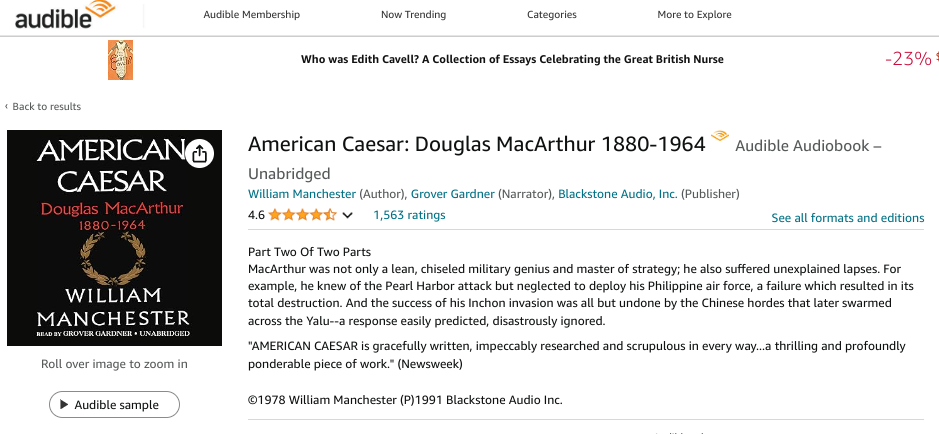Elon Musk replied to a tweet that had asked for audiobook recommendations.
Here is the list:
The Story of Civilization by Durant
Iliad (Penguin Edition)
The Road to Serfdom by Hayek
American Caesar by Manchester
Masters of Doom by Kushner
The Wages of Destruction by Tooze
The Storm of Steel by Junger
The Guns of August by Tuchman
The Gallic Wars by Caesar
Twelve Against the Gods by Bolitho
Genghis Khan by Weatherford
What are these books about?
They're mostly about war and are on average 15 hours long. Here is a review for each one.
Story of Civilization: A Monumental Journey Through Human History
Will and Ariel Durant's 11-volume masterwork "
The Story of Civilization" stands as one of the most ambitious and comprehensive historical surveys ever undertaken. Published between 1935 and 1975, this massive series attempts to chronicle the entire sweep of human civilization from ancient times to the Napoleonic era.
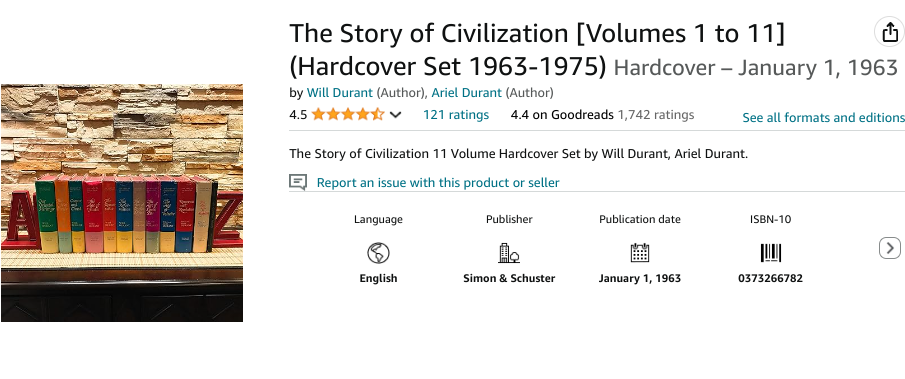
The Durants' writing style is engaging and accessible, bringing history to life through vivid storytelling and insightful analysis. They have a remarkable ability to synthesize vast amounts of information into coherent narratives, connecting historical events, cultural developments, and intellectual trends across time and geography. Their prose flows smoothly, punctuated by moments of wit and memorable turns of phrase that make even complex topics digestible for the general reader.
One of the series' greatest strengths is its interdisciplinary approach. The Durants weave together political, social, economic, religious, philosophical, and artistic threads to create a rich tapestry of human experience. This holistic view provides readers with a nuanced understanding of how different aspects of civilization influence and shape each other.
However, the work does have some limitations that modern readers should keep in mind:
1. Western-centric focus: While the series does cover some non-Western civilizations, particularly in the first volume, the bulk of the work concentrates heavily on European history and culture.
2. Dated scholarship: Written over several decades in the mid-20th century, some of the historical interpretations and factual information have been superseded by more recent research.
3. Overwhelming scope: At over 10,000 pages total, the sheer size of the work can be daunting for many readers.
Despite these caveats, "The Story of Civilization" remains an impressive achievement and a valuable resource for those seeking a broad overview of human history. The Durants' passion for their subject shines through on every page, inspiring readers into the fascinating tapestry of our shared past.
For newcomers to the series, it's worth noting that each volume can be read independently, allowing readers to focus on periods or civilizations of particular interest. The Durants' more concise work "The Lessons of History" also offers a distillation of their key insights for those not ready to tackle the full series.
In conclusion, while "The Story of Civilization" may no longer represent the cutting edge of historical scholarship, it endures as a monumental work of historical synthesis and a testament to the power of lifelong learning and intellectual curiosity. The Durants' ability to connect the dots across millennia of human experience offers readers a unique perspective on the grand sweep of history, making this series a rewarding read for history enthusiasts and casual readers alike.
The Durants' work is particularly noteworthy for its emphasis on cultural and intellectual history. They devote considerable attention to the development of art, literature, philosophy, and science, providing readers with a rich understanding of how ideas and cultural expressions have evolved over time. This approach helps to humanize history, moving beyond mere recitations of political events and military conflicts to explore the thoughts, beliefs, and creative outputs that have shaped human societies.
Moreover, the Durants' writing is often characterized by a sense of empathy and understanding for historical figures and cultures, even when discussing controversial or complex topics. They strive to present historical actors in the context of their times, helping readers to understand the motivations and worldviews that drove historical events and developments.
"The Story of Civilization" remains an unparalleled achievement in historical synthesis and a powerful demonstration of the value of taking a long view of human history. For readers willing to invest the time, the series offers a deeply rewarding journey through the triumphs, tragedies, and enduring legacy of human civilization.
Next book that Elon Musk recommends is:
The Iliad

The audiobook version of Homer's "The Iliad" offers a powerful and immersive experience of this ancient Greek epic poem. Listening to the story brings it to life in a way that closely resembles how it would have been originally shared - through oral recitation by skilled bards.
The narrative, which focuses on a few weeks during the final year of the Trojan War, is gripping and emotionally charged. It explores themes of rage, honor, fate, and the human condition against the backdrop of brutal warfare. The vivid descriptions of battle scenes, intimate moments between characters, and divine interventions create a rich tapestry that captivates the listener.
One of the key strengths of the audiobook format is how it highlights the poetic nature of the text. The rhythm and cadence of the language become more apparent when heard aloud, enhancing the overall experience. This is particularly effective in conveying the epic's opening lines, which set the tone for the entire work.
The quality of the narration is crucial in an audiobook of this magnitude. Different versions feature renowned actors such as Derek Jacobi, Alfred Molina, and Audra McDonald, each bringing their own interpretation and gravitas to the text. Their performances help to distinguish between characters and convey the intense emotions that run throughout the story.
It's worth noting that there are several translations available as audiobooks, including those by Robert Fagles, Stephen Mitchell, Caroline Alexander, and Emily Wilson. Each translation offers a slightly different approach to the text, which can affect the listening experience. Some listeners may prefer to sample different versions to find the one that resonates most with them.
While the audiobook format is excellent for experiencing the poem's auditory qualities, it may be challenging for listeners unfamiliar with the story to keep track of the numerous characters and complex plot lines. Some editions include supplementary material to help with this, but listeners might find it beneficial to have a written text on hand for reference.
In conclusion, the audiobook version of "The Iliad" provides an authentic and engaging way to experience this cornerstone of Western literature. It brings Homer's epic to life, allowing listeners to immerse themselves in the world of ancient Greece and the timeless themes that continue to resonate with audiences like Elon Musk.
Next book is
"The Road to Serfdom" by Friedrich A. Hayek is a seminal work in political philosophy and economics, now available as an audiobook. This classic text, originally published in 1944, offers a powerful critique of centralized economic planning and its potential consequences for individual liberty.
Hayek's audiobook presents a compelling argument that excessive government control over the economy can lead to a gradual erosion of personal freedoms and ultimately result in totalitarianism. He draws parallels between socialist policies and the rise of authoritarian regimes, warning that even well-intentioned efforts to centrally plan an economy can pave the way for despotism.
The narration effectively conveys Hayek's passionate and unrelenting style, making complex economic and philosophical concepts accessible to a broader audience. Listeners will appreciate the clarity with which Hayek explains the relationship between economic freedom and political liberty, arguing that capitalism is the only system compatible with human dignity, prosperity, and individual rights.
The audiobook's relevance extends beyond its historical context, offering a thought-provoking perspective on contemporary debates surrounding the role of government in economic affairs and serves as a cautionary tale and a call to vigilance in protecting individual liberties.
For those interested in political philosophy, economics, or the history of liberal ideas, "The Road to Serfdom" audiobook is an essential listen. It provides a compelling argument for limited government and free markets, while encouraging critical thinking about the relationship between economic systems and personal freedom.
"
The Road to Serfdom" by Friedrich A. Hayek is a seminal work in political philosophy and economics, now available as an audiobook. This classic text, originally published in 1944, offers a powerful critique of centralized economic planning and its potential consequences for individual liberty.
Next book is about General MacArthur, titled
'American Caesar'
"American Caesar" is a compelling and comprehensive biography of General Douglas MacArthur, narrated with skill and warmth by Tom Parker (also known as Grover Gardner in some editions). This audiobook offers listeners an in-depth exploration of one of the 20th century's most iconic and controversial military figures.
Manchester's incisive writing, combined with Parker's engaging narration, creates a vivid portrait of MacArthur's life from 1880 to 1964. The narrator's friendly tone and clear delivery make the complex subject matter accessible, giving listeners the feeling of a jovial uncle recounting war experiences with both humor and pathos.
One of the audiobook's strengths is Parker's ability to pronounce Japanese names, New Guinea cities, and American slang with effortless ease, enhancing the "you-are-there" quality of the narrative. This attention to detail helps immerse the listener in MacArthur's world, from his early military career through World War II and beyond.
Manchester doesn't shy away from presenting MacArthur in all his complexity. The general emerges as a brilliant yet flawed figure – a man of rare courage and loyalty, but also one plagued by vanity and a mercurial temperament. The biography covers all aspects of MacArthur's life, including his military achievements, his role as the peacetime administrator of postwar Japan, and his controversial actions during the Korean War.
The audiobook excels in providing historical context, offering listeners insights into American and Asian history of the period. It's particularly enlightening in its coverage of U.S. relations with Korea, China, and Russia, making it relevant even decades after its initial publication.
At times, the narrative can be dense with historical detail, which some listeners might find challenging to follow in audio format. However, the richness of the content and the quality of the narration generally overcome this potential drawback.
In conclusion, "
American Caesar" is a meticulously researched, well-narrated audiobook that brings Douglas MacArthur's story to life. It offers a balanced view of its subject, neither overly flattering nor excessively critical. For anyone interested in 20th-century military history or seeking to understand the complexities of one of America's most famous generals, this audiobook is an excellent choice.
Next recommended audiobook that Elon Musk enjoys is
Masters of Doom: How Two Guys Created an Empire and Transformed Pop Culture
Masters of Doom is the "amazing true story of the Lennon and McCartney of video games: John Carmack and John Romero. Together, they ruled big business. They transformed popular culture. And they provoked a national controversy."
The audiobook version of "Masters of Doom" by David Kushner, narrated by Wil Wheaton, is a captivating and well-produced account of the rise of id Software and its founders, John Carmack and John Romero.
Wil Wheaton's narration is widely praised for bringing the story to life. His performance includes fun voices and sound effects, demonstrating a clear appreciation for the content. Wheaton's engaging delivery helps maintain listener interest throughout the 12 hours and 43 minutes of runtime.
The book itself is highly regarded for its thorough research and compelling narrative structure. It follows the journey of Carmack and Romero from their early days at Softdisk to the founding of id Software and the creation of groundbreaking games like Commander Keen, Wolfenstein 3D, Doom, and Quake. The story doesn't shy away from the personal conflicts and business challenges faced by the team, providing a balanced and insightful look into the game development process.
"Masters of Doom" excels in blending non-fiction with narrative storytelling, making it accessible to a wide audience including developers, gamers, journalists, and anyone interested in the video game industry. The audiobook effectively captures the excitement and innovation of the early days of PC gaming, as well as the cultural impact of id Software's mature-themed games.
Listeners particularly appreciate the book's coverage of pivotal moments in gaming history, such as the development of smooth side-scrolling on PCs, the shift from shareware to retail distribution, and the emergence of esports. The audiobook also provides fascinating insights into the business side of the industry, including dealings with publishers and retail strategies.
While the book doesn't shy away from controversial topics, including the infamous Daikatana project and the eventual split between Carmack and Romero, it maintains a balanced perspective throughout.
For those interested in the history of video games, software development, or entrepreneurship, the "Masters of Doom" audiobook offers an engaging and informative experience. Wil Wheaton's narration enhances the already compelling story, making it a highly recommended listen for anyone fascinated by the evolution of the gaming industry.
Ok game over! Now it's time for a book recommendation in a different genre:
The Wages of Destruction by Tooze
This is huge audiobook so prepare to do a lot of listening.

"The Wages of Destruction: The Making and Breaking of the Nazi Economy" by Adam Tooze is a comprehensive and meticulously researched audiobook that offers a fresh perspective on the economic history of Nazi Germany. Narrated by Adam Tooze himself and Simon Vance, this 30-hour-long audiobook provides an in-depth analysis of the Third Reich's economy and its role in shaping World War II.
Tooze challenges conventional interpretations of Nazi Germany's economic policies and presents a compelling argument that Hitler's vision for German dominance was fundamentally shaped by his perception of America's overwhelming economic power. The author explores how Hitler's ambitious plans for creating a German super-state were ultimately hindered by Germany's limited resources and the regime's racial ideology.
The audiobook is divided into three main parts, covering the pre-war period, the early war years, and the final stages of the conflict. Tooze's narrative skillfully weaves together economic data, political decisions, and military strategy to provide a holistic view of Nazi Germany's rise and fall. His analysis of key figures such as Hermann Göring and Hjalmar Schacht offers valuable insights into the inner workings of the Nazi regime's economic machinery.
One of the strengths of this audiobook is its ability to make complex economic concepts accessible to a general audience. Tooze's clear explanations and the narrators' engaging delivery help listeners grasp the intricacies of Nazi Germany's economic policies, from the manipulation of the gold standard to the exploitation of conquered territories.
The audiobook has received critical acclaim for its originality and scholarship. It has been praised for stimulating debate and fundamentally changing the way historians view the Second World War[1][2]. Listeners have noted that while the content can be initially dry, the depth of information and analysis makes it well worth the investment of time.
For those interested in World War II history, economic history, or the inner workings of totalitarian regimes, "The Wages of Destruction" offers a wealth of information and thought-provoking analysis. The inclusion of a downloadable PDF with tables and figures enhances the listening experience, allowing for a more comprehensive understanding of the data presented.
In conclusion, "
The Wages of Destruction" is a landmark work that combines rigorous scholarship with engaging narration. It offers listeners a nuanced and often surprising perspective on the economic underpinnings of Nazi Germany, making it an essential listen for anyone seeking a deeper understanding of this critical period in world history.
Next is the ...
Storm of Steel
"The Storm of Steel: Original 1929 Translation" by Ernst Jünger is a powerful and unflinching memoir of World War I that offers readers a unique perspective from a German soldier's point of view. Originally published in 1920 and translated into English in 1929 by Basil Creighton, this version preserves Jünger's raw and immediate reflections on his experiences in the trenches.
The book is widely regarded as one of the best accounts of World War I ever written, presenting a vivid and intense portrayal of trench warfare. Jünger's clear and spare prose style effectively conveys the hellish atmosphere of the Western Front, immersing readers in the brutal realities of combat.
What sets this memoir apart is Jünger's complex attitude towards war. He describes the experience as exciting and even enjoyable at times, viewing it almost as a mystical adventure. This perspective offers a fascinating insight into the mindset of a young soldier who found meaning and purpose in the chaos of battle.
The 1929 translation is particularly valuable as it retains many of Jünger's original reflections on leadership, patriotism, and heroism, which were removed in subsequent revisions. This authenticity allows readers to engage with the author's thoughts and experiences as they were initially recorded, providing a more immediate and unfiltered account of the war.
Readers have praised the book for its balanced view of trench warfare and its very human portrayal of the conflict. The fact that it's written from a German perspective adds depth to our understanding of World War I, offering a counterpoint to the more commonly available British and French accounts.
With an average rating of 4.7 out of 5 stars from over 2,450 reviews on Amazon, "The Storm of Steel: Original 1929 Translation" is clearly resonating with modern readers. Its vivid descriptions, philosophical reflections, and unique perspective make it an essential read for anyone interested in World War I history or first-hand accounts of warfare.
In conclusion, "The Storm of Steel: Original 1929 Translation" is a compelling and thought-provoking memoir that offers valuable insights into the nature of war and its impact on the human psyche. Its unflinching portrayal of combat, combined with Jünger's complex and sometimes controversial views, makes it a challenging but rewarding read that continues to captivate audiences nearly a century after its initial publication.
Noticing a war pattern here until this audiobook. This is about life before wars.
The Guns of August
 Barbara W. Tuchman's "The Guns of August," narrated by John Lee and Wanda McCaddon, is an exceptional audiobook that brings to life the intricate events leading up to and during the first month of World War I. This Pulitzer Prize-winning work is renowned for its detailed and dramatic portrayal of the early days of the conflict, capturing the tension, miscalculations, and tragic decisions that set the stage for one of the most devastating wars in history.
Barbara W. Tuchman's "The Guns of August," narrated by John Lee and Wanda McCaddon, is an exceptional audiobook that brings to life the intricate events leading up to and during the first month of World War I. This Pulitzer Prize-winning work is renowned for its detailed and dramatic portrayal of the early days of the conflict, capturing the tension, miscalculations, and tragic decisions that set the stage for one of the most devastating wars in history.
Narration Quality
John Lee's narration is particularly praised for its versatility and engaging delivery. He adeptly handles the various accents and personalities of the numerous historical figures, from generals to statesmen, providing a rich and immersive listening experience. His ability to switch between characters and convey the gravity of the situations described by Tuchman adds a layer of depth to the audiobook that enhances its impact. Wanda McCaddon's contributions also add a complementary touch, ensuring that the narrative flows smoothly and maintains the listener's interest throughout the nearly 19-hour runtime.
Content and Style
Tuchman's narrative begins with the funeral of King Edward VII and meticulously traces the political and military maneuvers that led to the outbreak of war in August 1914. Her writing is both scholarly and accessible, making complex historical events understandable and engaging. The audiobook captures the essence of Tuchman's work, which reads almost like a novel due to her vivid descriptions and keen insights into the characters and their motivations.
Historical Insights
"The Guns of August" details the strategic errors and miscommunications among the Allied and Central Powers, highlighting the human elements behind the grand strategies. Tuchman's portrayal of figures such as Kaiser Wilhelm II and British Field Marshal Sir John French provides a nuanced understanding of their roles and the broader geopolitical landscape. The audiobook effectively conveys the suspense and drama of the period, making it an educational yet thrilling listen.
Critical Reception
The audiobook has been lauded for its meticulous research and narrative power. Critics have noted that Tuchman's ability to blend detailed historical analysis with compelling storytelling makes "The Guns of August" a standout work in military history. The narration by John Lee and Wanda McCaddon has been particularly noted for enhancing the text's accessibility and emotional resonance.
For anyone interested in World War I, military history, or simply a well-crafted historical narrative, "The Guns of August" audiobook is a must-listen. Its combination of Tuchman's masterful writing and the narrators' skilled performances ensures that this audiobook is both informative and deeply engaging.
Next book on the Musk list is ...
The Galiic War
The Gallic War is Julius Caesar's autobiographical diary of the wars in what is now France, Belgium, and parts of Britain, Germany, and Switzerland, in which he describes the battles that took place from 58 to 51 BCE when he fought the Germanic and Celtic peoples that opposed Roman conquest.
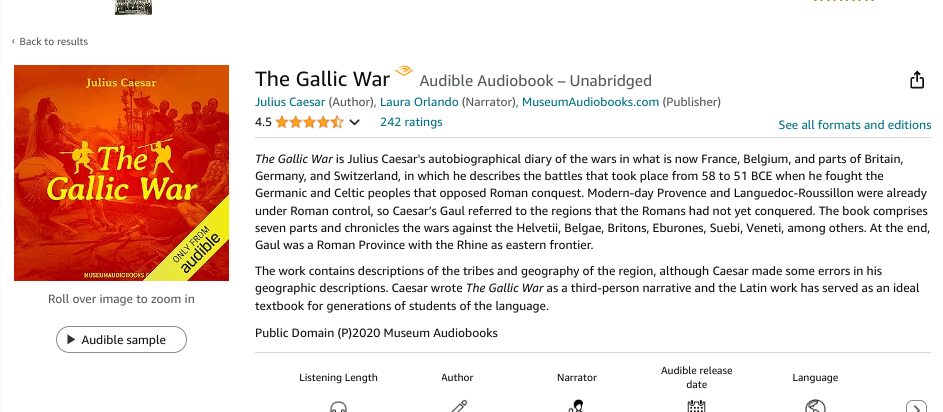
The audiobook version of "The Gallic Wars" by Julius Caesar offers listeners a compelling journey into one of the most significant military campaigns of ancient history. This firsthand account, narrated by Caesar himself, provides a unique and invaluable perspective on the Roman conquest of Gaul from 58 to 51 BCE.
The narrative, divided into seven parts, chronicles Caesar's campaigns against various Gallic tribes, including the Helvetii, Belgae, Britons, Eburones, Suebi, and Veneti. Caesar's detailed descriptions of military strategy, tactics, and the challenges faced by his legions bring the ancient world to life, offering listeners an immersive experience of Roman warfare.
One of the audiobook's strengths is its ability to convey Caesar's dual role as both a military commander and a skilled propagandist. His account not only serves as a military diary but also as a political tool, showcasing his leadership abilities and justifying his actions to the Roman Senate. This adds an intriguing layer of complexity to the narrative, allowing listeners to analyze Caesar's motivations and rhetorical strategies.
The narration likely plays a crucial role in the audiobook's effectiveness. While specific details about the narrator's performance are not provided in the search results, a skilled narrator would be able to capture Caesar's authoritative tone and bring his vivid descriptions of battles, negotiations, and Gallic customs to life.
For students of Latin, this audiobook serves as an excellent companion to the written text. As a core text in Latin education, hearing "The Gallic Wars" narrated can enhance understanding and appreciation of Caesar's prose style and military vocabulary.
The audiobook also offers valuable insights into Roman military practices and the geopolitical landscape of ancient Europe. Caesar's detailed accounts of his campaigns provide listeners with a unique window into the strategies employed by the Roman army and the various cultures they encountered.
One potential drawback for some listeners might be the dated nature of the text. Caesar's perspective is undoubtedly biased and reflects the attitudes of his time. However, this can also be seen as an opportunity to critically engage with historical sources and understand the Roman worldview.
Overall, the audiobook version of "The Gallic Wars" is a must-listen for history enthusiasts, students of classical literature, and anyone interested in ancient military campaigns. It offers an engaging blend of military history, political intrigue, and cultural observations, all narrated from the perspective of one of history's most famous figures. Whether used as a study aid or for personal enrichment, this audiobook brings Caesar's account of the Gallic Wars to life in a way that is both educational and entertaining.
Next book is...
Twelve Against the Gods
The 1929 collection of short and exquisitely written biographical essays on the lives of such famed adventurers as Alexander the Great, Casanova, Christopher Columbus, Napoleon, and Isadora Duncan.
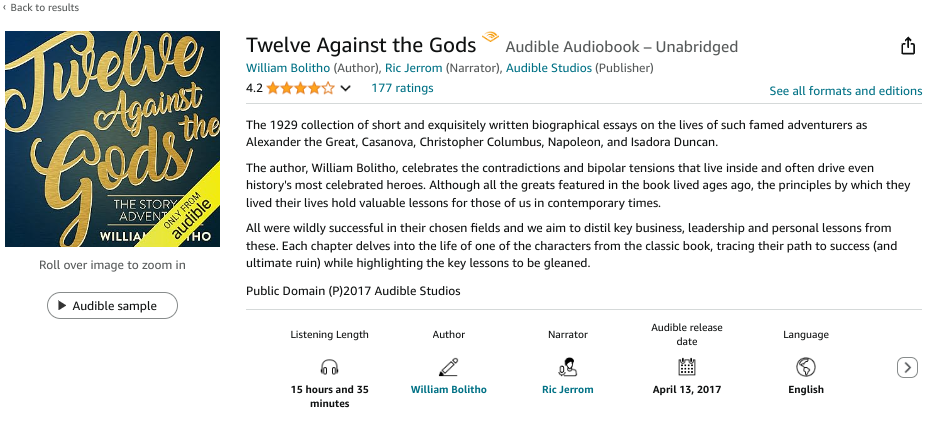 "Twelve Against the Gods" by William Bolitho, narrated by Ric Jerom, offers listeners an engaging exploration of 12 historical figures who defied convention and shaped history through their adventurous lives.
"Twelve Against the Gods" by William Bolitho, narrated by Ric Jerom, offers listeners an engaging exploration of 12 historical figures who defied convention and shaped history through their adventurous lives.
This audiobook, based on Bolitho's 1929 collection of biographical essays, provides vivid portraits of iconic adventurers such as Alexander the Great, Casanova, Christopher Columbus, and Napoleon, among others. Jerom's narration, which spans 15 hours and 35 minutes, likely brings these historical figures to life with appropriate gravitas and flair.
Bolitho's writing style, described as exquisite and insightful, offers a unique blend of biography, psychology, and philosophy. The author writes about the nature of adventure itself, examining the conflict between society's expectations and the innate human desire for freedom and exploration. This approach provides listeners with not just historical facts, but also thought-provoking reflections on human nature and the allure of adventure.
One of the audiobook's strengths is its wide selection of subjects, ranging from ancient conquerors to 20th-century figures like Isadora Duncan and Woodrow Wilson. This variety keeps the listening experience fresh and allows for interesting comparisons across different eras and cultures.
Listeners should be prepared for the book's 1929 perspective, which may include some outdated language or viewpoints. However, this historical context also provides valuable insights into how these figures were perceived in the early 20th century.
While some listeners might find the language and references challenging at times, the audiobook format allows for an immersive experience of Bolitho's rich prose. The narration likely helps clarify complex passages and brings the author's vivid descriptions to life.
Overall, "Twelve Against the Gods" offers an intellectually stimulating and entertaining journey through the lives of history's great adventurers. It's particularly well-suited for history enthusiasts, biography lovers, and those interested in exploring the psychological aspects of ambition and adventure.
Next book and again, not too peaceful is ...
Genghis Khan and the Making of the Modern World
'The Mongol army led by Genghis Khan subjugated more lands and people in 25 years than the Romans did in 400. In nearly every country the Mongols conquered, they brought an unprecedented rise in cultural communication, expanded trade, and a blossoming of civilization.'
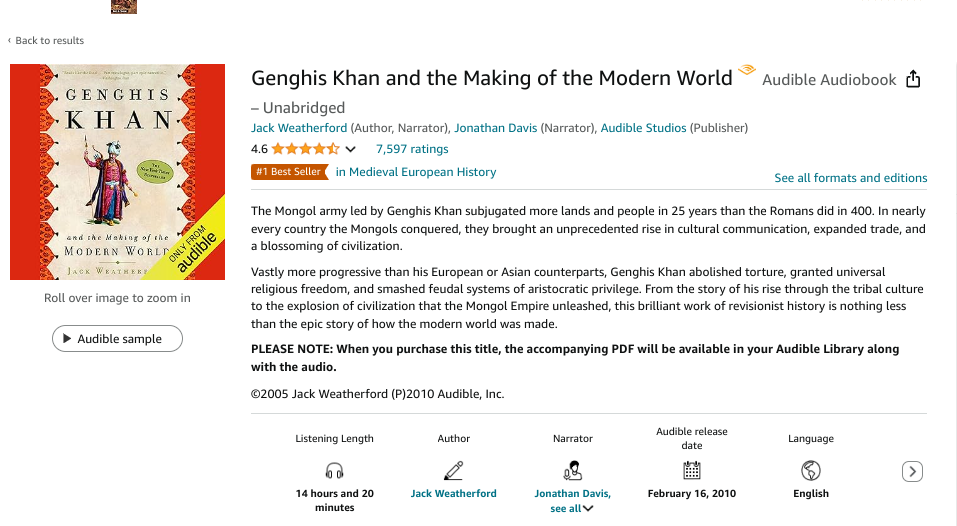
The audiobook "
Genghis Khan and the Making of the Modern World" by Jack Weatherford, narrated by Jonathan Davis, is a captivating and enlightening exploration of Genghis Khan's life and the far-reaching impact of the Mongol Empire on world history.
Weatherford's work offers a fresh perspective on Genghis Khan, challenging many Western misconceptions and presenting a more nuanced view of the Mongol leader and his legacy. The book not only covers Khan's conquests but also delves into the lasting influence of Mongol rule on the development of the modern world, including advancements in trade, governance, and cultural exchange.
Jonathan Davis's narration is a standout feature of this audiobook. His performance has been described as one of the most enjoyable and technically impressive in non-fiction audio. Davis's ability to confidently and nonchalantly pronounce difficult Mongolian words and names adds authenticity to the listening experience, enhancing the audience's engagement with the content.
The audiobook is particularly praised for its engaging narrative style, which makes the historical content accessible and captivating. Weatherford's clear writing style, combined with Davis's expert narration, brings the complex history to life, making it enjoyable for both history enthusiasts and casual listeners alike.
One of the strengths of this audiobook is its comprehensive approach. It not only covers Genghis Khan's life and conquests but also explores European perceptions of the Mongol empire, its later fragmentation, and eventual decline. The book provides significant attention to Kublai Khan, offering listeners a broader understanding of the Mongol Empire's evolution.
While the audiobook focuses primarily on Genghis Khan and Kublai Khan, some listeners might find the limited coverage of other Mongol khanates, such as the Golden Horde, to be a minor drawback.
Overall, "Genghis Khan and the Making of the Modern World" is an engaging account of Genghis Khan and the Mongol Empire's influence on the modern world. The combination of Weatherford's insightful writing and Davis's masterful narration makes this audiobook a truly enriching and enjoyable listening experience.






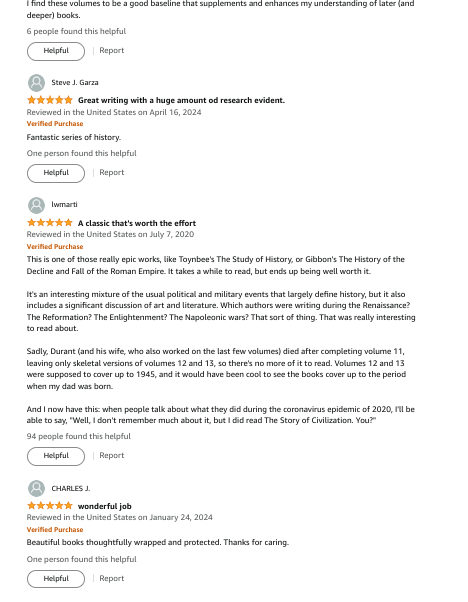
 The audiobook version of Homer's "The Iliad" offers a powerful and immersive experience of this ancient Greek epic poem. Listening to the story brings it to life in a way that closely resembles how it would have been originally shared - through oral recitation by skilled bards.
The audiobook version of Homer's "The Iliad" offers a powerful and immersive experience of this ancient Greek epic poem. Listening to the story brings it to life in a way that closely resembles how it would have been originally shared - through oral recitation by skilled bards.